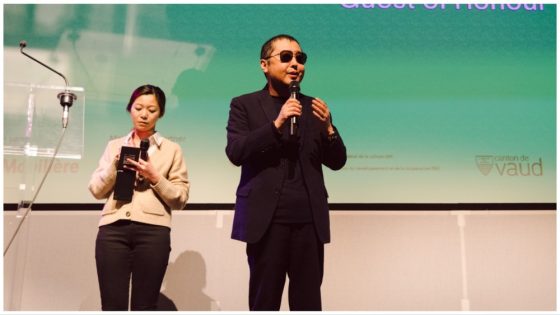Sporting a warm smile and a pair of sunglasses – “Sorry, I’ve been busy editing and my eyes hurt,” he explained – one of China’s leading indie directors Jia Zhangke, whose upcoming film “Caught by the Tides” will be vying for the Palme d’or in Cannes next month, was guest of honor at the 55th edition of Swiss doc festival Visions du Réel this week.
Finished just in time for submission to Cannes, the film features his wife Zhao Tao, his muse over the last two decades, and tells the story of a couple spanning 20 years.
Explaining how the pandemic gave him the opportunity to review his footage all the way back to 2001, he described his new film as “a concentration of 20 years’ experience,” which blends footage shot with equipment ranging from 16mm film to 5D and even experiments with AI.
“I used whatever was available, I won’t wait until conditions become favorable to make a film. I can make a film with any equipment available – digital or other – I even used AI! I am happy to embrace all technologies: artists should make attempts – we can embrace or reject it – but we must get to know this technology first.”
Jia’s visit to the fest marks his first trip abroad since the outbreak of the pandemic, and he was clearly enjoying being back in Europe.
One of the foremost members of China’s politically contentious “Sixth Generation,” whose body of work embraces a broad spectrum of filmmaking, Jia is also a festival darling in Europe, where he won the Golden Lion in Venice for “Still Life” in 2006, and has been nominated no fewer than six times in Cannes, picking up best screenplay in 2013 for “A Touch of Sin.”
After receiving VdR’s Prix d’Honneur Monday, Jia spent more than two and a half hours at a masterclass in Nyon’s packed Marens Theater on Tuesday, answering questions from film critic Jean-Michel Frodon, as well as members of the audience, with characteristic humanity and modesty.
On the question of censorship in China, which he experienced with his first films, Jia clarified: “I don’t make compromises. I stay true to my principles. If my films cannot be shown on screen I won’t yield or make concessions,” he said, adding that he and his team set up an independent film festival in China seven years ago.
“With China producing more than 1,000 films a year, most of them by young directors, I wanted to host an event that focuses on them so that audiences can get to know them. Many of the films at the festival also come from Eastern Europe, South America, and other Asian countries, where they couldn’t get funding – I want to dedicate my festival to these films to convey different world views. (…) It’s an independent event, not some festival funded by public money. My colleagues and I worked very hard to preserve this event – we are all idealists – it requires a great deal of sacrifice, but we have succeeded.”
Notably famous for his so-called “slow cinema,” which includes long, static takes shot in medium to long distance, Jia quoted French film critic André Bazin: “I love long takes because they allow me to convey a democratic form of cinema. I can understand Bazin: a contemporary film leaves empty spaces, and it is precisely with these empty spaces that a film is complete, because the audience can fill them with their own emotions.
“It’s a way of respecting the audience: I see the audience as my equal. I don’t want my films to be propaganda, to manipulate the audience to make them cry or laugh – there are too many such films. Directors are not gods, we don’t seek to impose an ideology, we are simply sharing with the audience, and they can decide for themselves.”
This confidence in his audience was reflected in another question on the difference between the way Western and Chinese viewers receive his films: “When I make a film I never worry about my audience because they are all human beings, they all have emotions. I think that humanity has more in common – our commonality transcends differences. We must be confident that our work is destined to be shared by everyone,” he told the crowd with a smile, adding that he wants his films “to be playful.”
“I want my films to be relaxed – sometimes there are jokes – I don’t want them to be perceived as classics. My films are like a living entity, with a life of their own,” he went on, joking that they were just like children, which you must be prepared to let go of when they turn 18.
A retrospective of Jia’s work runs throughout Visions du Réel, which wraps on April 21.
Source Agencies


